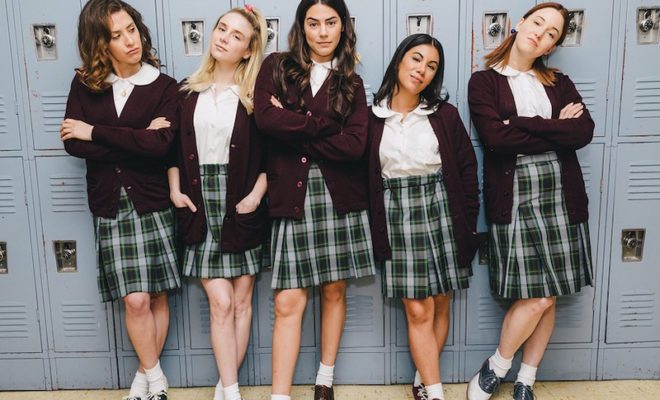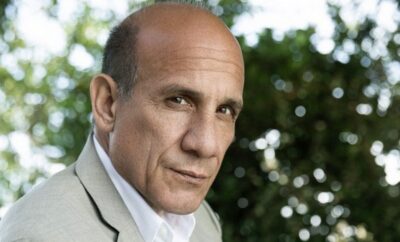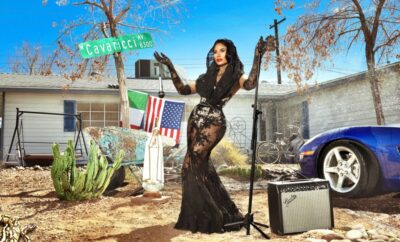
Interviews
Lissette Feliciano – Women Is Losers
By: Jennifer Vintzileos
Q) What inspired you to write the film Women is Losers?
A) The inspiration for the film was a conversation I had with my mom. I was working in the industry, and I was struggling to make anything really. And I started realizing, “Oh, I think this doesn’t have like—the obstacles here are kind of getting silly. And I’m not sure. Maybe this is just me, maybe I’m just not that good and that’s just the end of the story.” And so I had to go home and had to talk to my mom, who has been with me through this process since my days in NYU. And she’d always told me to work hard, buck up, don’t complain, just keep going. So, I never had done those things. But then I had to come home to her like one Christmas and just say, “Timeout: I’m so ashamed to tell you this, but I’m failing hard left, right and center. I don’t know what to do. It’s not working. And I think I’ve just sent us down this like, rabbit hole of hell. And I’m really sorry that I like”—I’m tearing up just saying this, “but I like I’m really sorry that I spent our money and our time in this endeavor, and it’s just not working. And I think I wasn’t what I thought we could be.” And she had—I mean, I guess I don’t know she—I guess it was the way I was saying you’re heartbroken.
She walked me through, for the first time really in our relationship, about what had happened to her when she was starting to become—she wanted to be a real estate investor. And then she wanted to be in real estate industry in San Francisco in the 60s and 70s, which was damn near impossible for a woman, let alone for a woman slightly more tan. So, she told me kind of everything that she was going through and she had received she showed me like documents, and I couldn’t believe that that was legal at the time. And I couldn’t believe that she had gone through that and then I couldn’t believe that she had succeeded. With all of those obstacles, they were nothing compared to mine, but they were so similar. And that was the part that was really shocking for me, it was like that they were so similar to the point where it was like almost no time had passed. That was hard for her because she obviously never told me these things. She didn’t want to put them in my way. But they ended up being my way anyways, and I wasn’t able to recognize them. So, I didn’t want anybody else to go through that. So, the inspiration was to have that conversation with my mother become a movie where like, every time we do the fourth wall break like that’s the realizations and the energy and the fire and just relentless, like ripping your hair out-ness that that conversation was for me and for her.
Q) I know the movie was titled after a song by Janis Joplin. So, what made you decide on that being the title?
A) I went to research the musicians of that time period, and I wanted them to be female. And there’s not that many because of all of the things that are in this movie. And, of course, you can’t really throw a rock in the music scene without hearing Janis Joplin. The funny thing is I had never really listened to her music before. When I started listening to her music I thought, “Well, first of all, my god she’s amazing.” And then I started researching her music and like early time periods—I really like early time periods in an artist’s life, like the most pure versions of themselves. I found out this was one of her first songs, I think, is the second one she ever wrote herself. She only wrote like eight number ones, and this was one of them. And the title was “Women Is Losers”, and she’d always been presented to me as I’m sure she’d been presented to you as a feminist icon. So, I was very thrown by that title and was angry and it made me hit play. “What is she talking about? How dare she.” And then when I listened to the song, obviously it was it was just like hit me over the head with a hammer that it was like the theme. She’s talking about the pains of being a second-class citizen and the pains of feeling like no matter what you do, you just can’t get on top of the situation. It was crazy that what I was writing in the script was what she was writing in her song fifty to sixty years earlier. And so, I did a little prayer. I said, “I’m going to borrow this from you. And someone’s going to make me change it at some point, but I’ll keep it there for as long as I can.” And it’s crazy to me that this is going to come out on HBO Max on October 25. And I have not had to change the title. That’s insane. So, yeah, that’s kind of how that happened.
Q) And how involved were you when it came to the casting of the film?
A) Very very—I’m always very involved with the casting. I had an amazing casting director, Claire Coats, who’s just wonderful. And she and I cast having similar feelings on the casting. It has to feel right. And it’s less about fitting a certain demographic or fitting a certain look or aesthetic or anything like that it just has to feel right. So, Lorenza [Izzo], we did a really extensive search. And so many women came to the story, and they were all so great and so wonderful. And it made me sad was they’d come into the room, and they’d say, “This is the only thing of substance that we’ve had for a very long time.” And that really upset me because they’re auditioning, and they’re fantastic. And just because they’re more tanlike, this is the only thing that they’ve gotten that they could like really dig into. And that was horrifying, because they should have been doing everything. So, I saw a lot of people and then when I met Lorenza she was she was unavailable for a while. She was on Quentin Tarantino’s Once Upon a Time InHollywood… and their schedule kept moving. So, we thought it just wasn’t going happen. And then that finally wrapped, and Lorenza and I sat down for a lunch, and we didn’t even talk about the script. We didn’t talk about any of that stuff. We just kind of talked about our backgrounds and how we grew up and, you know, our moms and what did we learn? What did we want to see change? And what do we want to say? And we were both in a position in our lives where we were going through transformational experiences, like just, we were at a point in our lives where we were the third act, Celina already wanted to tell that story. So, that was that with Lorenza, and then Bryan Craig, he came onto the story three days before. He was like our last person that came on—my leading men always show up like last minute. I don’t know why. And he had to learn this script, like the day of and he was off book within like seconds. And his first scene was the opening scene. It was such an amazing person to work with. Obviously, Chrissie Fit, she’s the only person that I read for Marty because she came in just crushed the scene. And I was like, “Well, that’s it. There’s nothing else I need to see.”
And that’s the thing – just like trust, kind of trusting your instincts just if it feels right, like go for it. You could sit there and keep reading and reading or reading or reading a million people. But if it already felt right, just let it go. And obviously you saw what she did in the movie. So, it worked. Simu Liu obviously came on. That character was a lot older. At first that character supposed to be 60s, like late 60s. And so Simu read. And I originally passed because the character was supposed to be older. And I went home, and I watched “Kim’s Convenience” just randomly on TV and I didn’t realize he was in it. So, I watched it and he had the scene with his father in the show. And it’s a sitcom, so it’s like it’s really easy to film that show and if you wanted to, but there was this drama between the father and him that was comedic but also sad and generational. I was like, “Oh, wow! Okay, well, that’s what I need. Who cares if the character is supposed to be older? Let’s just make them younger.” And so, we did and that’s how Simu ended up being in the movie. He obviously did an amazing job so I got lucky this casts I usually can’t even believe it. Sometimes I’m still watching it like wow, but we’re all here. We all kind of came to it together and I was really lucky to have them, and they do were very trusting of me. So, I was really lucky that they trusted me and stuff like that. It was it was really fun.
Q) Now, I absolutely love the friendship between Celina and Marty. So, when creating their characters, was there anyone that you used to base them on?
A: Yeah, me and my best friend. Marty is my bestfriend Tina. And she’s that person to a tee. She’s always had my back. She’s always been there for me. She defends me when I don’t know how to defend myself, makes me laugh—and you know I for her, provide I think like a love and stability. And we’re just like, that’s just kind of how we are all the time. And so, we wanted to have for that character, those two characters, because it’s partly it’s my mom’s story, and it’s also my story. It’s like a lot of women’s stories, so I wanted to put that in there. That was cool shooting those scenes in the high school because I shot them in my high school and putting them in my, like, Catholic school girl uniform and shooting conversations I had happen when I was fourteen or fifteen. It was awesome.
Q) I felt thoroughly engrossed in Celina’s character arc throughout the film, were there any words of advice or wisdom that you’ve been imparted to Lorenza to help her get into that character?
A) Thank you, it means a lot. It was a collaboration for sure. She’s a very brave actress. She’s the bravest actress that I’ve probably ever met. And when we were collaborating on this on the character, it was mostly about how we had we wanted it to feel. So, we put the breaking the fourth wall moments (we would call those fire moments, right?) …Those are moments where we get to pull out of the required passivity of this character for her to survive within the circumstances. And us, as women, 2021 get getting to comment on the passivity that isn’t necessary in order for the survival and our frustration with it. It was really about creating kind of like a space of “what do we want to say, what do you want to say as a human” and just kind of letting that live, letting that be and trusting that that was going to work. Because if it was true for her, it was going to come across true for the audience. If it wasn’t true for her than it was not going to come. And that’s just generally how I direct like, if it was not if you’re not in it, like if you haven’t dropped in, (I say drop in a lot on set) like it’s not going to translate.
One thing I will say, Lorenza has these amazing eyes. She has these big, big eyes. And they’re so amazingly beautiful to the camera, but one tiny move this way or this way and it’s just like, “Whoa” —like the whole audience has to move their eyes with her. So, we devised this thing on set where I was like, “You’ve watched Christopher Walken movies, right?” And she goes, “Yeah.” I was like, “He doesn’t blink or look away ever.” So, when we were in a scene, I would sometimes like shout across the hall like “Christopher Walken” and then she would just like stop moving her eyes. I would hold it and that would be the shot.
Q) In the movie seems to have a little bit of trouble with most of the male figures in her life, except for Minerva’s husband, Calvin (Cranston Johnson) and her son Christian (Lincoln Bonilla). To you during the writing process, what was it about those characters, particularly Calvin, that you wrote them so differently from the other male characters?
A) I never wanted to judge the male characters. Even though a lot of them do things that are obviously very difficult, it was just about showing that these are characters in her life. And these are people that are based on real people and based on real experiences, and she has to kind of balance those things, but they’re also a part of their time. There was a regiment that Calvin and Minerva (Liza Weil), in particular, that they’re based on my godparents who were also an interracial couple. They’ve always been a support system for my mother. And for me, to this day, they’re supportive of the film and they’re just always there. And it felt like, your found family. They represent your found family. Everybody else in her life, they represent the hierarchies at work, or represent actual family like we were born into. And the found families, which are usually the ones that we choose for ourselves, if they’re a little bit more maternal or softer it’s because of things that were asking for them. And they were deprived of and found.
Q) I heard Frederik Wiedmann composed the music for the movie whose resume of work is quite extensive. How did you come to work with him on the film?
A) We met and I was like, “How do you want to do this?” He said, “Because it’s really—like I feel for this character.” I said, “Well, thank you like—Okay, then let’s do it.” And it was—he’s a genius it took two days to get the score together so fast. Some stuff that we did on our first meeting, like is still in the movie. And he was the one that actually gave me the [idea] to do Snow Patrol at the end because we’re talking about the final scene. I wanted it to feel like a sound bridge to the future—wherever the audience goes now this theme, this feeling has to go with them. So, I want that sound bridge within the score. And he’s like, “Yeah, it feels like a Snow Patrol song” and we put it in there just jokingly and I heard it I was like, “That’s it.” And then he was like, “It was not in the 70s,” and I was like, “Do you anyone was going to care?” He was like, “I don’t know.” And I was like, “Alright, let’s do it.” And so that’s how Snow Patrol ended up in there and I don’t care. It’s not from the 70s, but I don’t care. That was the feeling so great. Yeah, he’s amazing. And I was really, really lucky to get to work with him.
Q) What I also love is that you wrote the characters like Mateo, Gilbert and Don Juan (Steven Bauer) as antagonists, but you eventually like show their humanity. Why was it important to you to capture their characters in a more human, less villainous type of light?
A) Probably because I know them. I know these people. They’re people that have been very abused in life and I’ve been part of like the folklore of my family or the folklore of my neighborhood and I think when you know someone, it’s really hard to one dimensional-izethem and that so much as a creator is what I’ve been working towards is these communities are portrayed very much one dimensionally a lot of the times and it’s because there’s not that familiarity with it. Don Juan is my step grandfather and inspired by and he’s—he did some really not great things, but he also provided a roof as horrible as this situation when under the roof was it was. You can always find a little bit of goodness in anybody, I think, at least they’d seems it seems like. It was about it was about not judging anyone really just you’re in the situation—Don Juan’s a product of his time. Mateo’s a product of his time. Gilbert’s a product of his time. And when we can, hopefully, what I hope happens – and I’m not sure if this will happen because one movie can’t do everything, and I’m sure I’ve made mistakes through the movie and it’s going to be perceived [however it’s going to be perceived] – like I don’t think one movie can you define any huge communities like too much to ask for one movie. But what I do hope the men in the film see is some space to reflect. When men watch the movie, some space to reflect without judgment. It’s nice to maybe go, “Yeah, I could probably do better without being defensive.”
Q) Given the recent political climate, do you believe that the message of the film Women Is Losers still holds even today?
A) Well, I will let the audience decide, I think we’ll let the audience decide. We made it with the intention to show that we go through a lot and will continue to go through a lot. And this is pretty interesting. Nothing we ever planned or what happened was not something that happened in a mysterious way. It’s always coming out. Now, when everything is going down, it’s going down, you know? It’s almost like a rallying cry in a weird way. Like, remember how strong. Remember what happened. Remember where you were. Remember where you came from and go forth with that knowledge and in that strength.
Q) Do you have any new upcoming projects you can tell us about?
A) I do but I can’t say anything yet. I do have a few. I’m working on a couple of TV shows now. So, hopefully, we’ll be able to like find a bigger pond to like, bring all those actors and all the friends together that just want to have some a bigger playing ground that we can all kind of explore and everybody—like Asian American culture and African American culture. Like every I grew up in a melting pot. I grew up in the Mission District, so it’s just very much part of who I am. And, yeah, and another film very soon. Hopefully.
Q) What message do you hope viewers take away from the movie?
A) My mom raised me with the mantra of “You got to get up.” Okay, we fell, get up. We fell, we’ve got to get up. And that hopefulness and that inspiration and that whatever that’s happening in the world, the only thing that I can control is myself. And if you see my mother’s journey and inspires you in any way to believe in yourself to believe in your own gumption, your own ability to do stuff, your ability to rise, even though the circumstances are tough depending on who you are in this country. If you don’t like not having hope or the ability to believe that it can be possible, it seems to make the journey that much harder. My mom would want everybody to know is go get it, do it. You can. You’re smart, you’re capable, you are strong. They’re going to come after you. They’re going to come and try to get you like, that’s what happens all the time. That’s part of the playbook. Keep going.
WOMEN IS LOSERS airs Monday, October 25th at 3am ET/ 12:00am PT on HBO Max





You must be logged in to post a comment Login